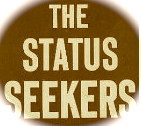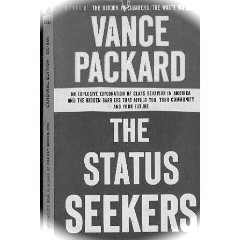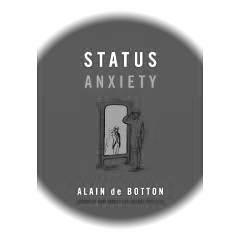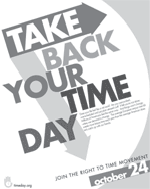 What role do envy and status anxiety play in the long hours (and unbalanced lives) of so many American lawyers and other professionals? A Labor Day op/ed piece by Dalton Conley (chairman of New York University’s sociology department) suggests the answer is a very big role. In “Rich Man’s Burden” (New York Times, September 2, 2008), Prof. Conley tells us that “Americans working on holidays is not a new phenomenon” for a nation infused with the Protestant Work Ethic, but something is very different in our era (emphases added):
What role do envy and status anxiety play in the long hours (and unbalanced lives) of so many American lawyers and other professionals? A Labor Day op/ed piece by Dalton Conley (chairman of New York University’s sociology department) suggests the answer is a very big role. In “Rich Man’s Burden” (New York Times, September 2, 2008), Prof. Conley tells us that “Americans working on holidays is not a new phenomenon” for a nation infused with the Protestant Work Ethic, but something is very different in our era (emphases added):
“[I]t is now the rich who are the most stressed out and the most likely to be working the most. Perhaps for the first time since we’ve kept track of such things, higher-income folks work more hours than lower-wage earners do. Since 1980, the number of men in the bottom fifth of the income ladder who work long hours (over 49 hours per week) has dropped by half, according to a study by the economists Peter Kuhn and Fernando Lozano. But among the top fifth of earners, long weeks have increased by 80 percent.
 “This is a stunning moment in economic history: At one time we worked hard so that someday we (or our children) wouldn’t have to. Today, the more we earn, the more we work, since the opportunity cost of not working is all the greater (and since the higher we go, the more relatively deprived we feel).”
“This is a stunning moment in economic history: At one time we worked hard so that someday we (or our children) wouldn’t have to. Today, the more we earn, the more we work, since the opportunity cost of not working is all the greater (and since the higher we go, the more relatively deprived we feel).”
Editor’s Personal Note: A few decades ago, after I entered the legal profession, my blue collar relatives and their friends found it very hard to believe that I “had” to work more than 40 hours a week. (It sounded like an excuse for not getting back home more often.) They truly believed that my law degree was a ticket to the easy life, which to them meant having Free Time to enjoy the Big Bucks. And, they felt a lot less envious of my plight after seeing the (lack of) life style that went with my bar membership.
Sociologist Conley then reminds us that it is not technology — having laptops, Blackberrys and mobile phones — that has caused the omnipresent workday, but hidden economic realities such as “America’s income inequality.” It is not the inequality between rich and poor, however, that causes the rich man’s work burden:
“[I]t turns out that the growing disparity is really between the middle and the top. . . . [T]he top half has been stretching out like taffy. In fact, as we move up the ladder the rungs get spaced farther and farther apart.
“. . .. [T]hose Americans who are in the top half of the income distribution experience a sensation that, while they may be pulling away from the bottom half, they are also being left further and further behind by those just above them.
![]() “And since inequality rises exponentially the higher you climb the economic ladder, the better off you are in absolute terms, the more relatively deprived you may feel. In fact, a poll of New Yorkers found that those who earned more than $200,000 a year were the most likely of any income group to agree that “seeing other people with money” makes them feel poor.
“And since inequality rises exponentially the higher you climb the economic ladder, the better off you are in absolute terms, the more relatively deprived you may feel. In fact, a poll of New Yorkers found that those who earned more than $200,000 a year were the most likely of any income group to agree that “seeing other people with money” makes them feel poor.
“Because these forces drive each other, they trap us in a vicious cycle: Rising inequality causes us to work more to keep up in an economy increasingly dominated by status goods. That further widens income differences.
” . . . So, if you are someone who is pretty well off but couldn’t stop working yesterday nonetheless, don’t blame your iPhone or laptop. Blame a new wrinkle in something much more antiquated: inequality.”
Conley is surely correct about the existence of this vicious cycle, but he seems to be laboring in a sociology values-free zone. It’s not economic inequality that causes the well-off to feel deprived and driven to work more. It’s the psyches and values of the well-off that leave them dissatisfied with income levels that — by any objective standard — allow them to lead the Good Life, and to spoil their lives by working more and more to acquire more and more income and status goods.
 Working more to “keep up with the Jones” is not a new phenomenon in our society. A half century ago, Vance Packard explained in The Status Seekers (1959) that:
Working more to “keep up with the Jones” is not a new phenomenon in our society. A half century ago, Vance Packard explained in The Status Seekers (1959) that:
“[M]ost of us surround ourselves, wittingly or unwittingly, with status symbols we hope will influence the raters appraising us, and which we hope will help establish some social distance between ourselves and those: we consider below us. The vigorous merchandising of goods as status symbols by advertisers is playing a major role in intensifying status consciousness. Emotionally insecure people are most vulnerable.
“Many people are badly distressed, and scared, by the anxieties, inferiority feelings, and straining generated by this unending process of rating and status striving. The status seekers, as I use the term, are people who are continually straining to surround themselves with visible evidence of the superior rank they are claiming. The preoccupation of millions of Americans with status is intensifying social stratification in the United States.” [find five chapters from The Status Seekers here]
Packard also noted in 1959 that the psychic rewards of engaging in a learned profession do not seem to be enough “to get difficult tasks performed.” Therefore:
“A man who undergoes years of arduous training necessary to become an accountant will be motivated to undergo that training only if there is a reward at the end. One reward, of course, is the satisfaction of being an accountant. But most people require additional rewards — even the Soviets are discovering — in the form of pay and prestige.”
A few years ago, in his book Status Anxiety, Alain de Botton argued that we are more irked by differences between what we have and what “our ostensible equals” have than by those who dwell far outside our own reference group:
 “There are people whose enormous blessings leave us wholly untroubled, even as others’ negligible advantages become a source of relentless torment for us. We envy only those whom we feel ourselves to be like—we envy only members of our reference group. There are few successes more unendurable than those of our ostensible equals.”
“There are people whose enormous blessings leave us wholly untroubled, even as others’ negligible advantages become a source of relentless torment for us. We envy only those whom we feel ourselves to be like—we envy only members of our reference group. There are few successes more unendurable than those of our ostensible equals.”
. .. from Status Anxiety by Alain de Botton (via AnnabelleMagazine)
How does this relate to lawyers? From our vantage point, it looks as if over-worked lawyers suffer from the same affluenza and status anxiety as their professional and social counterparts across American society, and then make it worse by falling into the Bar’s own brand of stratification and snobbery — the myth that professional success can only really happen at the biggest, most prestigious law firms (or, perhaps, by becoming filthy rich or immensely powerful to compensate for being a lesser kind of lawyer). See, e.g., Scheherazade’s piece “Why are lawyers such snobs?” and our response, from September 2003:
It’s too bad that most people graduate from law school before they’re mature (experienced? confident?) enough to listen to their inner voice, or to even have a clear voice inside letting them know who they really are. Instead, they only hear a peer group and a society that puts prestige, power and profit above personal fulfillment — or, worse, actually thinks that those 3Ps will give you personal fulfillment.
In “do lawyers choose to be unhappy?” (March 3, 2006), we opined:
As Evan Schaeffer suggests today, we do this to ourselves, by buying into the Big Lie that Big Law is the only true source of success in our profession. Partners make it worse by insisting on higher and higher PPP (profits per partner) — see Adam Smith Esq for analysis.
 However, as Prof. Patrick Schiltz, Steven Keeva, and the f/k/a Gang (repeatedly) have pointed out, the greed of young lawyers feeds into the process, making it virtually impossible to cure on a systemic basis.
However, as Prof. Patrick Schiltz, Steven Keeva, and the f/k/a Gang (repeatedly) have pointed out, the greed of young lawyers feeds into the process, making it virtually impossible to cure on a systemic basis.
We each can, with courage and “sacrifice”, take charge of our own life and happiness. Wanting less money and needing less prestige will go a long way toward nurturing healthy and happy attitudes.
Similarly, in September of 2003, we said:
[L]awyers in the USA and UK, seem to stress prestige and income far too much — causing them to choose the most stressful jobs, with the highest demands on their time — and far too often feel under-respected, under-appreciated and underpaid.
Partners make it worse by insisting on higher and higher PPP (profits per partner) — see Adam Smith Esq for analysis, and MorePartnerIncome for the pathology, in action. However, as Prof. Patrick Schiltz, Steven Keeva, and the f/k/a Gang (repeatedly) have pointed out, the greed of young lawyers feeds into the process, making it virtually impossible to cure on a systemic basis.
Steven Keeva, who has long studied and written about personal fulfillment for lawyers, has noted:
![]() “Recent research shows that students who come to law school with a strong sense of intrinsic motivation—helping others or making a difference—very often experience a dramatic shift toward extrinsic motivations during law school. Their focus then tends to be on such factors as making a lot of money and impressing other people. What one ultimately chooses to count, if anything, will likely be closely connected to these sources of motivation.”
“Recent research shows that students who come to law school with a strong sense of intrinsic motivation—helping others or making a difference—very often experience a dramatic shift toward extrinsic motivations during law school. Their focus then tends to be on such factors as making a lot of money and impressing other people. What one ultimately chooses to count, if anything, will likely be closely connected to these sources of motivation.”
In “Temptation to Tally: Change Your Definition of Wins and Losses to Find New Meaning in Your Practice” (ABA Journal, June 2004), Keeva says that few students seem to leave law school having been sensitized to sources of satisfaction “that don’t fit neatly into the win-lose/zero-sum model of legal reality.” He advises us to look inside — and to rely on “a simple gut check” — to discover what really motivates our actions. Then, when you measure your career and life satisfaction,
“counting any given item will be valuable to the degree to which it reflects what is important to the lawyer, regardless of what the larger culture deems important.”
Keeva hopes that someday, our gut will tell us “that counting is no longer necessary.” Continuing the discussion, he wrote an article titled “Practicing Your Passion” (GPSolo Magazine, July/August 2005), to help the individual lawyer find attitudes, practices, and exercises that will let him or her “Choose Your Own Culture,” rather than take for granted the many negative messages sent out by the legal culture. One such message is that “Lawyers who work in certain practice areas or settings—say, personal injury law or small-town practice, rather than doing ‘prestigious’ corporate work in big-city law firms—are, by definition, wanting.”
![]() We need to ask ourselves whether our ideas about what makes a successful career are our own, or whether we’ve simply internalized what the legal culture, and the “the larger, hyper-acquisitive culture in which we live,” have thrown at us. For example, Keeva asks:
We need to ask ourselves whether our ideas about what makes a successful career are our own, or whether we’ve simply internalized what the legal culture, and the “the larger, hyper-acquisitive culture in which we live,” have thrown at us. For example, Keeva asks:
Does time really equal money? Is taking life at a moderate pace really for losers? You need to ask if it’s the culture talking, or if the message comes from a more solid source—say your own gut; the thoughts and feelings of people you know, trust, and admire; or your spiritual beliefs?
Keeva is right when he counsels, “If you want to find passion in your law practice but seem to be having difficulty, take some quiet time and make a list of such cultural messages.” Of course, most of you (like the entire f/k/a Gang included) may find it challenging to find and maintain quiet time for reflection, much less “to identify the many “givens” in your life. But he’s surely correct to say:
“[I]t is well worth the effort. This exercise will get you ready for a true transformation in your work: Instead of responding reflexively to situations, you can consciously choose to act—or not act. Once you’re able to do that, you will be able to choose your own culture.”
There’s no easy way to break out of the American (and general human) habit of comparing our own success (and appearance of success) with that of others, and feeling dissatisfied when our Good Life seems eclipsed by the apparent Better Life of others. As a mediator, I often told clients that one good way to start feeling a particular feeling or value is to act like we already possess it.
. . ![]() Take Back Your Time Day. One way you might “do something” to show a new attitude toward work and time is to actively participate in and spread the word about Take Back Your Time Day, which will be celebrated this year on October 24th. As they say at their website:
Take Back Your Time Day. One way you might “do something” to show a new attitude toward work and time is to actively participate in and spread the word about Take Back Your Time Day, which will be celebrated this year on October 24th. As they say at their website:
TAKE BACK YOUR TIME is a major U.S./Canadian initiative to challenge the epidemic of overwork, over-scheduling and time famine that now threatens our health, our families and relationships, our communities and our environment.
Some of our readers may recall our post from October 2005, titled “Take Back Your Time Day — it’s for lawyers, too“. In it we shared this news:
According to the San Francisco Chronicle, “A survey by the Families and Work Institute in New York found that 1 in 3 Americans feels chronically overworked, and a study by the American Sleep Institute found that 50 percent of Americans would be willing to work fewer hours for less pay. (SFGate.com, “Overworked No More,” Oct. 22, 2005)
The bad news is that so many people feel overworked. But, look again at that good news: “50 percent of Americans would be willing to work fewer hours for less pay.” If half of Americans are smart enough to feel that way, why are you still grinding away so that you can buy more status goods? Surely, we all have better sense than that (or at least half of us do).
I’m going to leave you with my words from 2005, hoping it will motivate at least some of you to join in with the Take Back Your Time folks on October 24, and maybe help promote some of their causes (like joining the civilized world by mandating 3 weeks a year of paid vacation for all employees).
. . . ![]() . . Of course, lawyers love to see themselves as especially overworked, over-stressed, and beset by life balance issues — and far too many are. I just want to point out that a very large percentage of adults (and children) in our nation feels the same pressures. Joining with them in the broader movement may be the best way to change the policies and values that make us a nation that overworks, over consumes, and does a lot more talking about family values than living them.
. . Of course, lawyers love to see themselves as especially overworked, over-stressed, and beset by life balance issues — and far too many are. I just want to point out that a very large percentage of adults (and children) in our nation feels the same pressures. Joining with them in the broader movement may be the best way to change the policies and values that make us a nation that overworks, over consumes, and does a lot more talking about family values than living them.
Meanwhile, dagosan is going to look for their 2005 poster “More Time. Less Stuff,” while Prof. Yabut checks out the t-shirt: “Medieval Peasants Worked Less than You Do.”
I hope your busy-ness
isn’t contagious
cuckoo!
green with envy– 
blooming cherry trees
little house
harvest moon–
tonight even you
are busy!
morning’s first thing–
greedy eyes
on the green rice field
caged bird–
watching the butterfly
with envy
…….. by Kobayashi Issa, translated by David G. Lanoue 